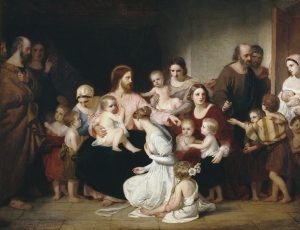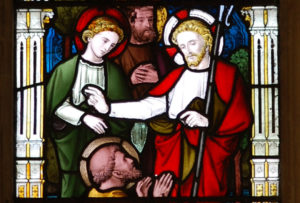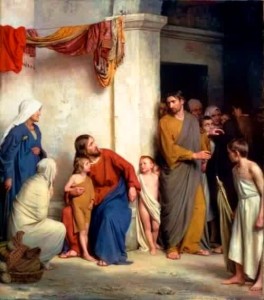Thoughts on Sunday’s Lessons for Sept. 15, 2024 (Pentecost 17B/Proper 19)
Season of Creation: Act Sunday

Peter the Apostle (c.1610-1614), oil painting on canvas by El Greco (1541-1614). El Greco Museum, Toledo, Spain. (Click image to enlarge.)
First Reading (Track One): Proverbs 1:20-33
Creation Focus: Wisdom: “Repent” before doom as hurricane
Poetry in the Hebrew Bible, including the Psalms and wisdom writings such as this passage from Proverbs, does not rhyme words or sounds as English poetry does. Rather, it rhymes ideas. Go through each verse here: Wisdom, embodied as a powerful woman, shouts out to the city and all its inhabitants: Be wise! Embrace knowledge!” Each verse is divided into two lines that support each other: The idea expressed in each first line is reflected, explained, or expanded upon in the second. Ideas rhyme. Watch for this poetic technique in the Hebrew bible, and see how meaning grows when each line builds on another to strengthen ideas.
First Reading (Track Two): Isaiah 50:4-9a
Creation Focus: Prophets are attacked yet rely on God in obedience
What could be more important to a community than its teachers, whose words shape our growth and understanding? The Israelites understood this teacher, Isaiah’s so-called “Suffering Servant,” to represent their nation in exile, suffering and enslaved yet relying still on God. Christians later imagined an image of Christ in this figure who endures opposition, turns the other cheek, and keeps on teaching until the people hear. Speaking with the tongue of a teacher, the Servant shows us God’s way.
Psalm (Track One): Psalm 19
Creation Focus: The sun and stars, night and day, speak directly of God
“The heavens declare the glory of God!” This psalm of praise sings out the beauty of creation, imagining the sun and stars themselves exulting at the glory of God at work in the universe. Mirroring the first reading’s exhortation to hear God’s word, its verses urge us to rejoice in our hearts about God’s perfect law and teaching.
Psalm (Track Two): Psalm 116:1-8
Creation Focus: Keep faith in deliverance, do not lose hope
Like Isaiah’s Suffering Servant, the Psalmist, too, speaks from a place of sorrow, grief, and loss of hope. In this Psalm, traditionally understood as a hymn of thanksgiving for recovery from an illness, the Psalmist is filled with despair. Entangled in the cords of death, he called out, and God responded. Now, rescued from death’s grip, his tears are wiped dry and his feet no longer stumble. Walking again in the land of the living, his heart fills with love for God, who has heard his voice in supplication.
Second Reading: James 3:1-12
Creation Focus: Tongues cursing others pollute God’s earth
The teacher’s tongue may tell God’s way, but our tongues are tricky, small but powerful. This passage from James engages in delightful wordplay, likening our tongues to other small but strong things that can control forces beyond their size: A horse’s bridle, a ship’s rudder, a spark that starts a forest fire. Watch our tongues, James warns. Our tongues can bless, but tongues may curse, too, staining not only our bodies but setting afire the whole cycle of nature. We must use them wisely to praise and bless our brothers and sisters, not to express hurtful things.
Gospel: Mark 8:27-38
Creation Focus: Lose your life[style] to gain God’s salvation for all
We are more than midway through the six-month-long season after Pentecost now. Jesus and the apostles are about to turn south on a long journey toward Jerusalem and the Cross. First, though, Jesus engages them with a challenging question: “Who do you say that I am?” Some guess John the Baptist, Elijah, or a prophet, but Peter forthrightly declares Jesus the Messiah. Jesus then speaks of his coming passion and death, and when Peter objects, Jesus rebukes him and calls him “Satan!” This is a stern, challenging side of Jesus, who tells his followers to deny themselves, to take up their cross and follow him, knowing that those who want to save their life must lose it.



